Interview with Kij Johnson
 Kij Johnson is an award-winning author of Fantasy and speculative fiction. Her debut novel The Fox Woman (2000), and its follow up Fudoki (2003), are beautifully and lyrical works of fiction set in a mythic ancient Japan that deal with animals and folklore, as well as exploring gender roles and ancient Japanese history. Her novella ‘The Man Who Bridged The Mist’ (2011) won the Hugo and Nebula award, whilst The Dream-Quest Of Vellit Boe (2016), her response to H. P. Lovecraft’s The Dream-Quest Of Unknown Kaddath (1927), won the World Fantasy Award. Most recently she has written The River Bank (2017), a sequel to Kenneth Grahame’s children’s classic The Wind In The Willows (1908).
Kij Johnson is an award-winning author of Fantasy and speculative fiction. Her debut novel The Fox Woman (2000), and its follow up Fudoki (2003), are beautifully and lyrical works of fiction set in a mythic ancient Japan that deal with animals and folklore, as well as exploring gender roles and ancient Japanese history. Her novella ‘The Man Who Bridged The Mist’ (2011) won the Hugo and Nebula award, whilst The Dream-Quest Of Vellit Boe (2016), her response to H. P. Lovecraft’s The Dream-Quest Of Unknown Kaddath (1927), won the World Fantasy Award. Most recently she has written The River Bank (2017), a sequel to Kenneth Grahame’s children’s classic The Wind In The Willows (1908).
Kij Johnson was in Glasgow to deliver a talk to the University of Glasgow’s Masters in Fantasy literature class, and very kindly agreed to speak to The Fantasy Hive while she was there.
Your most recent novel is The River Bank from Small Beer Press, which is a sequel to The Wind In The Willows. Would you be able to tell us a little bit about it?
The River Bank was me looking at a book that I really liked as a child. I didn’t really think very much about it when I was a little kid, I just read it and loved it and enjoyed the adventures, and responded to the language, although I didn’t really know much about language at that point. And then I would read it every few years, but never critically. A few years back I reread it, and it was the first time I realised that there were just no females. The only ones there are a charwoman and the prison laundress, and the jailkeeper’s daughter who feels sorry for him. And I got to thinking, is this the fault of the time in which it was written, that there really were no places except these for women, or was it a condition of what [Kenneth] Grahame chose to write, and does the world open up? And since I’d just done this with The Dream-Quest of Vellit Boe, I tried it with this book and had a really different experience, which is that it sort of happily opened up to women. It just opens up to little women animals!
What were the differences between engaging with The Wind In The Willows for The River Bank and engaging with H. P. Lovecraft’s problematic influence in The Dream-Quest Of Vellit Boe and how it relates to The Dream-Quest Of Unknown Kaddath?
Even beyond that, he’s centrally located because the canon has chosen to centrally locate him. He wasn’t a very important writer while he lived. He thought he was! He talked about himself as being really significant. But he was surrounded by especially English writers who are writing incredibly powerful stuff, using some of the same tools, so that everything that he does, somebody else was doing either before, or at the same time, but better. But because he had really ardent defenders, not just in himself but then August Derleth, and then S. T. Joshi, we ended up with him centrally located as the voice that defines a kind of weird or eldritch horror. And it’s not earned, really. There are other writers doing better.
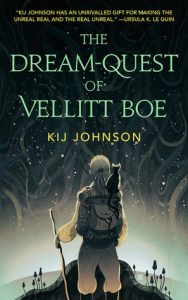 So part of my response was, why are we always reading Lovecraft? Because this is the way I think, the way I wanted to get inside of it was actually get inside the story, and word by word, choice by choice, see if I would make the same choices he does. So Dream-Quest of Unknown Kaddath has a whole set of beats: here’s our guy who lives in the waking world, but he sees something he wants that he can’t have, and he challenges the gods for it and they take it away. And then instead of saying, which another character might, let me find something else, he goes back to the Dreamland, as though entitled, and then we get a series of set piece adventures. Things happen, he keeps getting kidnapped, he keeps having to be rescued by cats or ghouls, he keeps centrally locating himself in everybody’s narrative. And all the way through it, all of these beats, I just wrote a list on one side of a piece of paper and I said, what’s the opposite? OK, he’s a young white guy, he’s in his early 20s if you read the rest of the Dreamland stories. So she’s not. He’s white, she’s not. He’s from our planet, she’s not. And just by inverting things, or at least saying, with this different character, she’s going to make different decisions. She’s not young, sort of privileged and stupid the way he is. He relies a lot on the fact that he’s a dreamer. There’s this sense all the way through, like Toad actually, of him saying, do you know who I am? And so I wanted to come from what it’s like to actually exist, to move through this world instead of stomp on that world. And that’s why the story plays out the way it does. There are a whole set of episodes that don’t reflect in my story because my character, who’s a sensible woman in her 50s, wouldn’t make the same decisions. She wouldn’t get drunk with the guys who she knows have the scary ship, she wouldn’t do these things. So I guess the short answer is just that I took the original and I basically went into conversation with every single beat of it, and said, why is that decision being made by Lovecraft, why is that decision being made by Carter, how else might that decision be made? And it was really interesting to write but a lot harder than I thought it would be.
So part of my response was, why are we always reading Lovecraft? Because this is the way I think, the way I wanted to get inside of it was actually get inside the story, and word by word, choice by choice, see if I would make the same choices he does. So Dream-Quest of Unknown Kaddath has a whole set of beats: here’s our guy who lives in the waking world, but he sees something he wants that he can’t have, and he challenges the gods for it and they take it away. And then instead of saying, which another character might, let me find something else, he goes back to the Dreamland, as though entitled, and then we get a series of set piece adventures. Things happen, he keeps getting kidnapped, he keeps having to be rescued by cats or ghouls, he keeps centrally locating himself in everybody’s narrative. And all the way through it, all of these beats, I just wrote a list on one side of a piece of paper and I said, what’s the opposite? OK, he’s a young white guy, he’s in his early 20s if you read the rest of the Dreamland stories. So she’s not. He’s white, she’s not. He’s from our planet, she’s not. And just by inverting things, or at least saying, with this different character, she’s going to make different decisions. She’s not young, sort of privileged and stupid the way he is. He relies a lot on the fact that he’s a dreamer. There’s this sense all the way through, like Toad actually, of him saying, do you know who I am? And so I wanted to come from what it’s like to actually exist, to move through this world instead of stomp on that world. And that’s why the story plays out the way it does. There are a whole set of episodes that don’t reflect in my story because my character, who’s a sensible woman in her 50s, wouldn’t make the same decisions. She wouldn’t get drunk with the guys who she knows have the scary ship, she wouldn’t do these things. So I guess the short answer is just that I took the original and I basically went into conversation with every single beat of it, and said, why is that decision being made by Lovecraft, why is that decision being made by Carter, how else might that decision be made? And it was really interesting to write but a lot harder than I thought it would be.
That’s really interesting, the parallels between Carter/Lovecraft and Toad, I would never have picked up on that!
And yet, and yet! He’s constantly, he doesn’t quite come out and say the way Toad does, “Only I could have done this!” which Toad does all the time, but it’s implied. And Carter spends a lot of time screaming like a little girl, which is fair in that world, but Toad also spends a lot of time having a tantrum and kicking his little heels.
When writing in these worlds created by other writers, does that come with a responsibility to the original source material?
Yes, absolutely there is, at least for me. My undergraduate training was in history, I didn’t start writing until I was out of college, in my 20s, and most of my history was ancient history, in that poorly documented period from about the 5th century to the 8th century in England, so Anglo Saxon and Latin. To be honest, what I was really interested in doing was essentially getting a degree in D&D settings. But there was no way to do that back then, so instead I found a historical time and place that was as close to a D&D setting as I could get, and treated it like history, which it was. I had a very rigorous tutor, and so he was never letting me get away with stuff. I was doing a lot of research and realising that there are these huge gaps that have to be filled somehow. Because the experience of living in the 6th century is quite different than what a historian learns from the documents, or even from archaeological or anthropological evidence. I was always trying to say, with this level of technology, how would these people think? With this level of agriculture, how would these people think? How did they fill their days? We have this sense that they fill their lives with drudgery and work, then they go to bed early cause there’s no light, or they’re listening to creepy stories by the firelight. But in fact they had a lot of minutes in every day, same as we do, and they filled them somehow. And they had a lot of the same problems that we do. Some of them had bad eyes, some of them had periods, some of them got old and had bad backs, some of them broke an ankle and it never healed right. So their life as lived was real to them. And so is the life as lived in fiction.
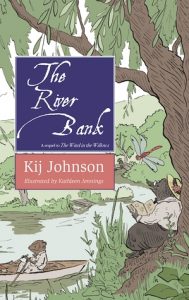 And so while I was working with these, one of the things I noticed about both of them is that life is not really lived as a real life in most fantasies. Most of the time there’s no economics. In The Wind In The Willows, when you read it carefully, there are servants mentioned. Everybody has servants. And yet when we read it as children our image is of these four adorable animals just having adventures, and nobody’s cleaning the dishes up. Nobody is sweeping the house. But Toad has servants, they’re mentioned. And I can’t remember if it’s explicitly stated or implied that Water Rat has at least one servant. It gets really interesting to think about the life as lived would be very different from the life as presented by the original author, but that there is possibly a real life behind what the author chose to tell you. And that’s where I get interested and that’s where I start trying to fill in. All the animals in The Wind In The Willows just don’t even notice lady animals. They just don’t even see them. And yet they have to be there. And so is it just that they don’t see them in the way that Edwardian men of a certain class just really didn’t see the women in their lives, or purported not to see them, because of course they saw them, they just didn’t write about them. So that becomes a big interest of mine, absolutely.
And so while I was working with these, one of the things I noticed about both of them is that life is not really lived as a real life in most fantasies. Most of the time there’s no economics. In The Wind In The Willows, when you read it carefully, there are servants mentioned. Everybody has servants. And yet when we read it as children our image is of these four adorable animals just having adventures, and nobody’s cleaning the dishes up. Nobody is sweeping the house. But Toad has servants, they’re mentioned. And I can’t remember if it’s explicitly stated or implied that Water Rat has at least one servant. It gets really interesting to think about the life as lived would be very different from the life as presented by the original author, but that there is possibly a real life behind what the author chose to tell you. And that’s where I get interested and that’s where I start trying to fill in. All the animals in The Wind In The Willows just don’t even notice lady animals. They just don’t even see them. And yet they have to be there. And so is it just that they don’t see them in the way that Edwardian men of a certain class just really didn’t see the women in their lives, or purported not to see them, because of course they saw them, they just didn’t write about them. So that becomes a big interest of mine, absolutely.
I feel this is one of the things that separates your work from core mainstream Fantasy. Do you think life as lived in these fantastical settings is something we could be exploring more of?
I love it when people do. I think absolutely we could do more of it. And I think we should do more of it. Because for instance just to go back to economy, economics. I’m always telling my creative writing students and especially my speculative writing students, you have to think about how is the food getting in and how is the shit getting out. Because of my training as a historian, I love reading diaries. And if you read Pepys’ diary, he has a roomful of shit in the basement of his house. He has a septic pit. And he complains about it. He’s like, oh it’s getting really stenchy down there, somebody better come and clean it. And just like any other married couple in the world, they’re like, oh we’ve got to get around to doing this, and nobody ever gets around to doing it, oh we’ve got to do it now. So finally somebody comes with a wagon and presumably shovels and pails, because they don’t have the big tubes that septic systems have in the United States. So presumably every house on his street had a solution like that. And when you think about that, just the economics of getting everyone’s faeces out of town. Because they have to pay somebody to do it, obviously. And those things are going to have to be bowling through the streets right alongside the rich people carriages. Right alongside every other thing. It’s so interesting because it makes the world so much more lively just to realise that a certain number of times per day, Pepys had to plug his nose and say, somebody’s got to clean this bathroom. Same as every set of college students ever.
Systems will be so much better when economics are addressed in a story, when we see how this city is being supported. Is it a trade city? Cause a trade city is very different than a city that relies upon a governmental centre. A trade city based on taking grain and getting it out of the region is very different than a trade city based on being on the shore, bringing fish in and sending it out. So, and that makes a world really lively. When your city is more than just what you imagine Minas Tirith to be like. A city is better when it’s got, you know, we’ve got more horses than most cities because we need them, because we can’t use wagons, so we have to have lots of horses, and we laid everything, we put it on ponies and we carry it. So that becomes really cool to me.
Your first two novels, The Fox Woman and Fudoki, are very heavily based on Japanese folklore. What was it that attracted you to the folklore of ancient Japan?
I came to Japanese history through the back door. Because I got really interested in women’s diaries. I was specifically interested in Fanny Burney and women’s diaries of the American West, but I read everything. I read Mary Kingsley who went to Africa and collected reptiles, and all these other really interesting women who would go off to strange places and write about them. Fanny Kemble went to the United States, which was hilarious and also really painful to read. And one of these was a book from the year 1000 called The Pillow Book by a noblewoman named Sei Shonagon. And she was essentially just treating it like a sort of public diary. It was just like a blog. And so today she’s like, you know what I really love, when the leaves are coming down and it smells so crisp, boy that’s great isn’t it? And then tomorrow she’s like so this guy stopped by, and he was kind of a jerk, he recited this poem to me, it wasn’t very good, so I recited this poem back, it was way better. So all of her diary entries would be this weird mix of sort of vignettes from her life and observations and little philosophical asides, and they were brilliant. She was funny, for instance, she explains that it’s the obligation of a priest to be good looking. Because if he’s not good looking people will look away and they’ll get distracted. She explains it with this wonderful wry voice. But a lot of this, because it was the year 1000, is really hard for us to understand. The social mores, the culture, this is the only period in history where women dominated the literature of the time and place. How did that happen?
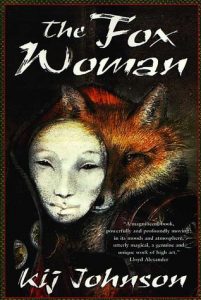 And there was a brilliant cultural history by Ivan Morris called The World Of The Shining Prince (1964), which was such a good piece of accessible but informational history that that got me started. And then I found all these other women’s diaries, and then I found all these other works from centuries afterwards, and a little bit from before, and then I got interested in the anthropology, and at some point, years and years in, I recognised that I was going to stop reading about Japanese history at some point, and I was going to start forgetting things. So if I wanted to write a story, I’d better do it while I still had that stuff. I was interested in canid behaviourism, and I just randomly picked a fox story out of Royall Tyler’s Japanese Tales (1987), which is his really good compilation of Japanese folk tales and fairy tales, and wrote a short story, and then sort of accidentally wrote an outline for it but I didn’t know how to write an outline, so I just kept inserting scenes to the short story, and eventually I had a hundred pages and Tor said we’d like to buy a book of this. So it took me another seven years to write it because I just kept inserting scenes. But after that I realised that I had other things I wanted to say. The second book actually is not nearly as closely based on folklore because the real source material is the really very paltry information about cats that they have, including the legend that the first cat was brought to Japan, they actually have a date, a specific emperor, and they say, this cat showed up, this day, that was our first cat. Probably not, you know, it’s mythic, but still. And also there’s an incomplete monogatari, which is this tale, or tale/diary/memoirs, which is called The Woman Who Loved Vermin, usually, and it’s just about this young woman. It’s half of a chapter, and there’s nothing after that, half a chapter about this girl who likes worms and everybody says she’s never going to grow up to much, and that’s all we have, and I just wanted to write about who this person was. All told I spent about 15 years doing Japanese research and it was really interesting, but at some point I started to hit like a limit of what I was capable of doing.
And there was a brilliant cultural history by Ivan Morris called The World Of The Shining Prince (1964), which was such a good piece of accessible but informational history that that got me started. And then I found all these other women’s diaries, and then I found all these other works from centuries afterwards, and a little bit from before, and then I got interested in the anthropology, and at some point, years and years in, I recognised that I was going to stop reading about Japanese history at some point, and I was going to start forgetting things. So if I wanted to write a story, I’d better do it while I still had that stuff. I was interested in canid behaviourism, and I just randomly picked a fox story out of Royall Tyler’s Japanese Tales (1987), which is his really good compilation of Japanese folk tales and fairy tales, and wrote a short story, and then sort of accidentally wrote an outline for it but I didn’t know how to write an outline, so I just kept inserting scenes to the short story, and eventually I had a hundred pages and Tor said we’d like to buy a book of this. So it took me another seven years to write it because I just kept inserting scenes. But after that I realised that I had other things I wanted to say. The second book actually is not nearly as closely based on folklore because the real source material is the really very paltry information about cats that they have, including the legend that the first cat was brought to Japan, they actually have a date, a specific emperor, and they say, this cat showed up, this day, that was our first cat. Probably not, you know, it’s mythic, but still. And also there’s an incomplete monogatari, which is this tale, or tale/diary/memoirs, which is called The Woman Who Loved Vermin, usually, and it’s just about this young woman. It’s half of a chapter, and there’s nothing after that, half a chapter about this girl who likes worms and everybody says she’s never going to grow up to much, and that’s all we have, and I just wanted to write about who this person was. All told I spent about 15 years doing Japanese research and it was really interesting, but at some point I started to hit like a limit of what I was capable of doing.
The Fox Woman, like many of your other works, features sections from the fox’s point of view. Is this something that you enjoy writing?
I guess so because I do it all the time! I didn’t ever think of myself as somebody who wrote about animals, but then it turns out everything I write is about animals, so I guess that makes me somebody who writes about animals. It is really interesting. When I was little, my father almost certainly was autistic, although he wasn’t diagnosed. And my mother showed many signs of Asperger’s Syndrome. My brother and I wrestled with this through our childhood, and took different strategies towards getting by in the real world. But it meant my whole childhood was spent trying to figure out how real people think, and that was the language I would use to myself: what does a real person do? What does a human do in this circumstance? And then I would try to mimic it behaviourally as I grew up, because I wanted to pass as a human being, but I never stopped watching everybody as though I was an outsider. And I didn’t watch animals any differently than I watched people, because they were all alien to me, and so I would watch cats and I would watch birds and I would watch raccoons and I would watch people, and I would watch boys and I would watch grownups and I would watch girls and I would watch babies, and all of these were like science experiments to me, observations.
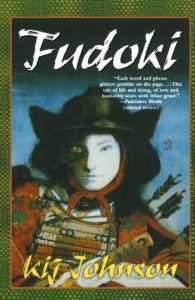 And when I started to write, I was so used to that being my thought process. What is inside this person? What is she thinking? And with animals especially, it felt a little more accessible, because honestly there were times in my life when I felt I knew a lot more about animals than I did people. And they also gave me a nice distancing mechanism. So I could write about wolves using all the research I had done into wolves, by really focusing on what is it like to actually be a wolf. I’d sit there thinking about how your shoulder would join differently, I’d think about the physiology and all the other things. But the more I thought of that the more I realised that I could just move from thinking about that to thinking about a person with the same stuff. And now every so often I just say you are going to write a story, it’s not going to have any animals, and it never works. There’s always some animal in it.
And when I started to write, I was so used to that being my thought process. What is inside this person? What is she thinking? And with animals especially, it felt a little more accessible, because honestly there were times in my life when I felt I knew a lot more about animals than I did people. And they also gave me a nice distancing mechanism. So I could write about wolves using all the research I had done into wolves, by really focusing on what is it like to actually be a wolf. I’d sit there thinking about how your shoulder would join differently, I’d think about the physiology and all the other things. But the more I thought of that the more I realised that I could just move from thinking about that to thinking about a person with the same stuff. And now every so often I just say you are going to write a story, it’s not going to have any animals, and it never works. There’s always some animal in it.
The short story ‘The Mantis Wives’ (2012) gets inside the heads of insect people. What was the driving force behind that?
That is a very short story, it’s only 900 words. I really enjoy formal stories, experimental stories. And I think I had written ‘The Apartment Dweller’s Bestiary’ (2015) before that, which is a collection of very short vignettes about mythic animals that live in your apartment if you’re single in your 20s, and I really enjoyed seeing how concise, how much information you can pack in, and how much emotion without sentimentality you can pack in. But what I missed about ‘The Apartment Dweller’s Bestiary’ is it’s a very quotidian story, it’s a story about ordinary things, and I missed that kind of wild visionary thing that I like to play with sometimes. So ‘Mantis Wives’ was me just writing very little tiny creepy jewels that were very short and very beautiful but also macabre. I think the framework may have come first, the beginning may have come first, and then just writing these different little ones were some of them were almost experiments, and then it just sort of pulled together in the end in a way I didn’t expect. I guess you could call it the last of my angry divorce stories, cause I had about six stories in a row that were wrestling with catastrophic losses and deep depression. And I was well past it when I wrote that, but it still reflects some of the same themes, about the way some people damage each other in pursuit of love, and playing around some with gender. As I was coming to terms with the fact that I was complicit in the way that things had happened, I was also letting the mantises come to terms with the fact that they all were complicit.
It explores gender in a way that reminds me of James Tiptree, Jr, as does ‘Spar’ (2013).
‘Spar’ was a strange story to write, because I basically wrote it in five days. Years and years before it had been a joke, because I had been writing these Japanese stories, and they were very elaborate and very hard to research, and I said my next story’s going to be about a human and an alien fucking in a lifeboat. And I would joke about that because then I don’t have to do any research, all I have to do is write a lot of sex. And it ended up being not like that at all when I finally wrote it. But it was a difficult story to write, and then I didn’t know if I wanted to send it to anyone. I eventually sent it to Clarkesworld, and there was a long pause. Clarkesworld will often get back really fast. So I waited and I waited, and I was like oh now they’re expunging my name from the record. Like, never let this woman near us! And then what turned out happened is their editor had sent it out to five or six writers that he knew and said, so this is either brilliant or horrible, another vote here? And evidently enough people said it was good enough so he published it. But I was scared when it was coming out, I was scared after it came out, it was a hard story to write.
You’ve spoken about the research that went into the Japanese tales. Is research central to how you write Fantasy?
Yes. That’s a really good question because it’s essential for me. I wrote a story called Ponies which is a very short story which is essentially My Little Pony-type ponies and little girls. It’s about what it’s like to be a little girl at the age of 9 to 11. And it’s short, and I started it as a joke for a friend of mine. I needed an idea for a story and she said, magic talking ponies. Write me a magic talking pony story. And I did, but I spent 25 hours watching My Little Pony videos, while I went all over their website, I played the game. All through this I was going, you don’t need to do this research Kij, you don’t need to. But I could not do it without knowing everything there was to know about the different generations of the ponies, and the people kitbash the ponies to make like, there’s a Predator pony, people buy pony blanks and then they turn them into characters.
But I always have to do research. I’ve said before, although then I’m afraid someone will take me 100% seriously, that I’m not really that creative. What I am is a really good researcher who does really good extrapolative thinking after that. The mantis story, even though it was 900 words long, I spent two and a half weeks researching mantis behaviour, even though it has nothing to do with real mantises. And that’s pretty much my experience with every story I ever write. I’m working on something right now, where a large part of it, well actually it’s not even a large part of it, half a chapter is about 1913 photography in Britain. It’s killing me because I can’t get any research on it, and I can’t imagine saying, well I have a 1913 collection of magazines about photography from the United States, yeah but it’s totally different! I’d say. And hairpins fly every direction. I can’t do it without a British magazine of photography. And that happens to me a lot. Research is what I love to do and it’s also the trap I fall down. There’s always another thing that needs to be researched.
As well as writing, you’ve also been editor for Tor and Dark Horse comics…
To be clear, I was a managing editor, I did production. Managing editor is the kind of job where you honestly can’t tell what they do! And for me, while I was at Tor, I took the manuscripts that the editors had worked, they handed it off to me and I essentially either hired or did copy editing and line editing, we got it type set, I did proof reading or hired people, we got covers which Maria Mellili did, so for that it was a production job. I ended up reading almost every book we did for a couple of years. Dark Horse I was a collections editor, which meant that the comics had already been produced, but I was selecting which comics I thought we should do collections of, because they didn’t have a publishing line, and I would select the editors or the introductions, I would select additional materials, get the covers done. Actually the closest to traditional editing was when I was with Wizards Of The Coast, working on TSR stuff, so when we rebooted D&D, we rebooted Greyhawk, I actually edited a bunch of work for that.
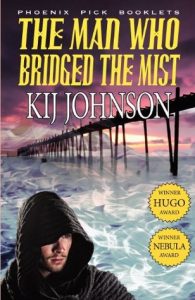 So how does working on that side of the industry influence the way you write?
So how does working on that side of the industry influence the way you write?
You know it kind of does actually. Production means I know exactly what I can get away with. And it means that I’m very aware of the artefact that people are reading. So there was a period when I would select where I would send the story based on whether I had designed the story to be read in print or read on the screen. Stories like ‘The Man Who Bridged The Mist’ (2011) went to a print publisher because people in spite of what they think don’t read that well on the screen. They lose attention and I wanted them to have the artefact in their hand and flip the pages. Whereas ‘Mantis Wives’ actually looks a little silly on the page cause there’s so much white space. But on a screen it’s perfect, because it’s like each piece gets a screen, maybe two, then you’re on to the next. So thinking that way means that I early on in the writing of a story knew whether or not it was going to be a print story or a screen story. I’ve sometimes published a story in the wrong place. ‘The Apartment Dweller’s Bestiary’ is meant to be a print story, it’s meant to be a chapbook, but I actually published it online and it’s actually less successful online than it would have been as a chapbook.
Because I don’t really write anything that’s solidly in the norm of any of those modes, I didn’t find that having read a lot of Robert Jordan, I said I can write a better Fantasy than that and then set out to do so, but I did find out that I was very knowledgeable about what the market was, and when I chose to write something that wasn’t going to fit the market, as I usually don’t, I’m fully aware that this story may get 6 people to read it, and I’m ok with that. Because I could write an epic fantasy, that’s what everybody wants me to write, or a space opera.
You are also one of the judges for the Theodore Sturgeon Memorial Award.
I won the award in 1994, it was the first award I ever won. And they asked me to judge it two years later. And now I’m the administrator, although we’re phasing someone in, Jason Balthasar right now. But that means that I read a lot of stories every year. And when we come up with our final ballot, it’s actually often quite different than the World Fantasy or Hugo or Nebula, or even the Locus, because our process of nomination is so different. Our preliminary readers are people who read 50 or more stories in a year. But then you vote, you send in nominations weighted, and we put all that through an algorithm, and we end up with a list and often our list is quite different.
Between those experiences you’ve built up an idea of what the field of Fantasy looks like over those years. How do you feel it’s moved over your time working in it?
A lot of people have talked about us moving through these phases. Fantasy specifically was dominated by the Ballentine Tolkien that came out in the 70’s. We had Lin Carter’s Fantasy series, and that was sort of an attempt to redress that. But there were an awful lot of really interesting writers who were writing in the decade after that who had one, two, three books out. Many of them were women, and there were many men like Dennis McKiernan and Stephen Donaldson writing, but everybody, men and women, were all writing the heroic fantasy, or the anti-heroic fantasy. So essentially there was a shape called The Lord Of The Rings, and everyone was colouring inside those lines. But they were trying to find their unique way to colour. So if you go back and read some of those books, some of them it’s very obvious, like Stephen Donaldson, what he was trying to do. Others, a lot of these women, were trying to subvert the quest without actually breaking the quest. So there are books where the quest is seven people just coincidentally, hilariously bump into each other, each with a separate quest but in the end it’s actually the same quest. So all of these attempts to counter the stranglehold of the Tolkien quest story.
Then urban fantasy really started to kick in, and to my mind one of the most important of the urban fantasy books was War For The Oaks (1987) by Emma Bull. And after that there was a spate of urban fantasies, although they were not called that yet, which were site specific. It’s Seattle and kelpies! There was a joke at the time about column A, column B. So it was pick colourful city, pick unnatural entity, pick interesting job for your character to have. And that A, B, C has continued to this day. It all became noir after a while, because of the Jim Butcher books, so everybody was writing, she’s a blacksmith who’s an ogre who lives in Portland, but it’s a mystery! It got really too restrictive but I’m hoping that it starts to crack open.
I think another real trend that started in the 70s and 80s started out as a kind of orientalist impulse. Esther Friesner wrote a really good book called Mustapha And His Wise Dog (1985), which is set in a sort of mythic Arabian Nights world, and everyone at that point was kind of experimenting with, and essentially that’s what I did, I wrote a story set in ancient Japan, there were stories all over the world, which was us attempting to open up the world from this sort of Icelandic Nordic Germanic constriction that Fantasy had fallen into right after Tolkien. It subsequently has kind of backfired, and there are lots of reasons why I wouldn’t write a third Japan book now, and some of them are that I’ve sort of moved past those themes, but some of them are also that it’s not my story to tell. In the 80s, when I did it, when I told the first story, nobody else was telling that story and I worked hard to make it as authentic as I could, and accurate, and historically appropriate. I tried really hard to do a good job, but I would never dare do that now, and I think the field has moved on to a place where there are so many voices that have not been heard that it’s time for them to be heard. Which interestingly is why I’ve been returning to some very specific to my family and my origins stories that I never thought I would tell.
What’s next for Kij Johnson?
I’m on sabbatical this semester, which means that what my university thinks I’m doing is writing a sequel to The River Bank called The American Tour, where in the manner of Oscar Wilde and Dickens, my mole Beryl the novelist is sent on a tour of America by her publicist. But the America that she is sent to is this sort of mythic America of the German novelist Karl May, who wrote novels of the Wild West without ever having been to the Wild West. And so the author of The American Tour who is not Beryl the novelist and is not me, is really struggling to keep her America straight. She gets the state names wrong. But part of why it’s quite slow is that I’m trying to make sure that while she’s really quite bad about remembering state names she on the other hand doesn’t make any mistakes about her Native American tribes. So I’m trying to keep it open and intelligent and right, as far as that goes, but also with this stream of, because honestly every time I come to Europe, they ask me where I’m from and I say Kansas and they say oh I’ve been to Toronto. And I get that because I do a certain amount of that too. Where’s this town? Oh it’s in France, never mind. So I’m working on that but I also am outlining a book after that which is kind of still in the very early stages of development, but is about a middle aged brother and sister who end up pulled through into a portal universe on opposite sides of a battle where everyone thinks that they have selected the chosen one. And then you’ve got this elaborate bluffing and double bluffing as each of them realises that they don’t have it which means that the other guys must have the real one. And it’s a very political story. And political is hard for me so I have to do a lot of thinking. But right now, short fiction. I just want to write something really short again, cause it’s fun.
Thank you Kij Johnson for speaking with us!
Kij Johnson is the author of The Fox Woman, Fudoki, The River Bank, the World Fantasy Award-winning The Dream-Quest of Vellit Boe, and the Hugo and Nebula Award-winning novella The Man Who Bridged The Mist.

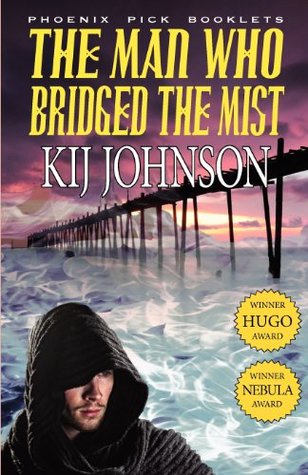
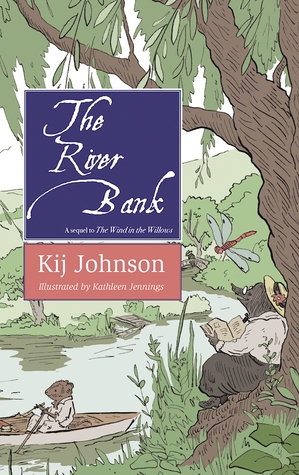
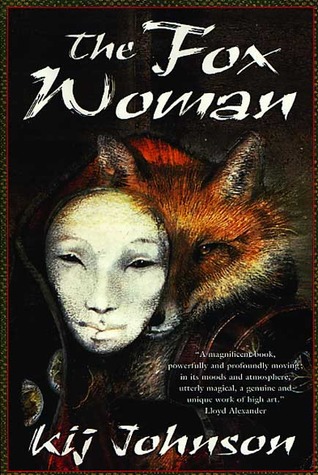
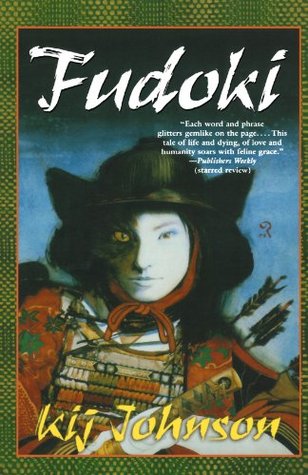
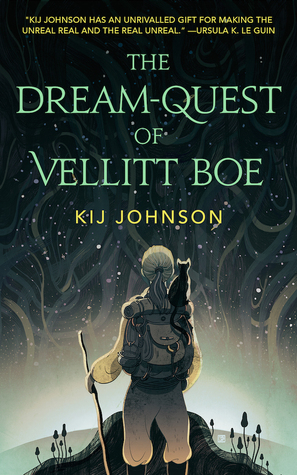
[…] Dog was also one of the few fantasies with an Arabian setting on the shelves in the mid-80s. In a wide-ranging interview at Fantasy Hive in 2018, Jonathan Thornton asked Kij Johnson how the field of fantasy had changed […]